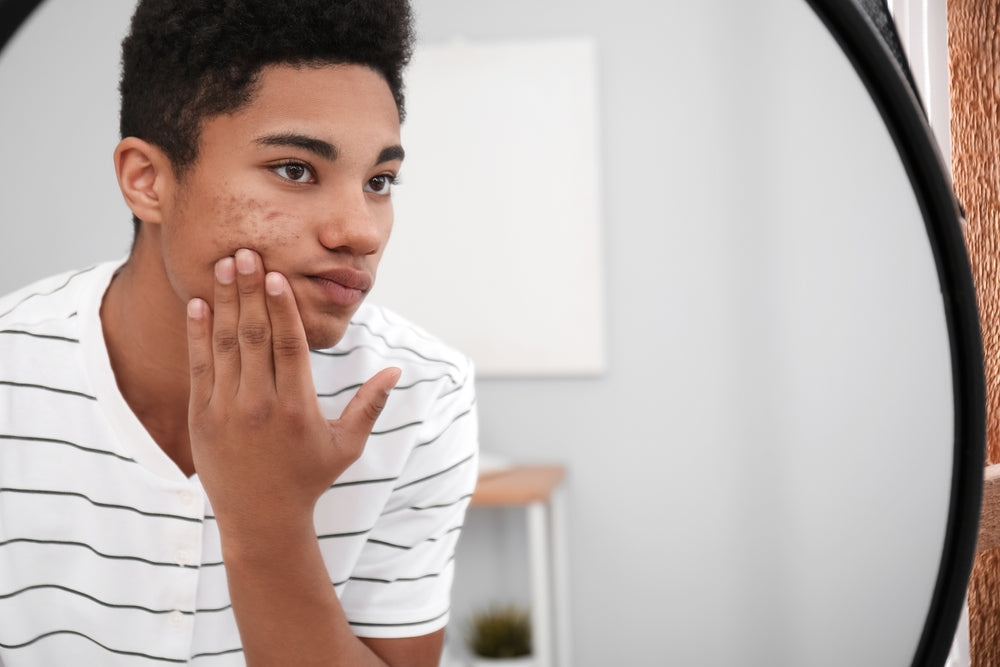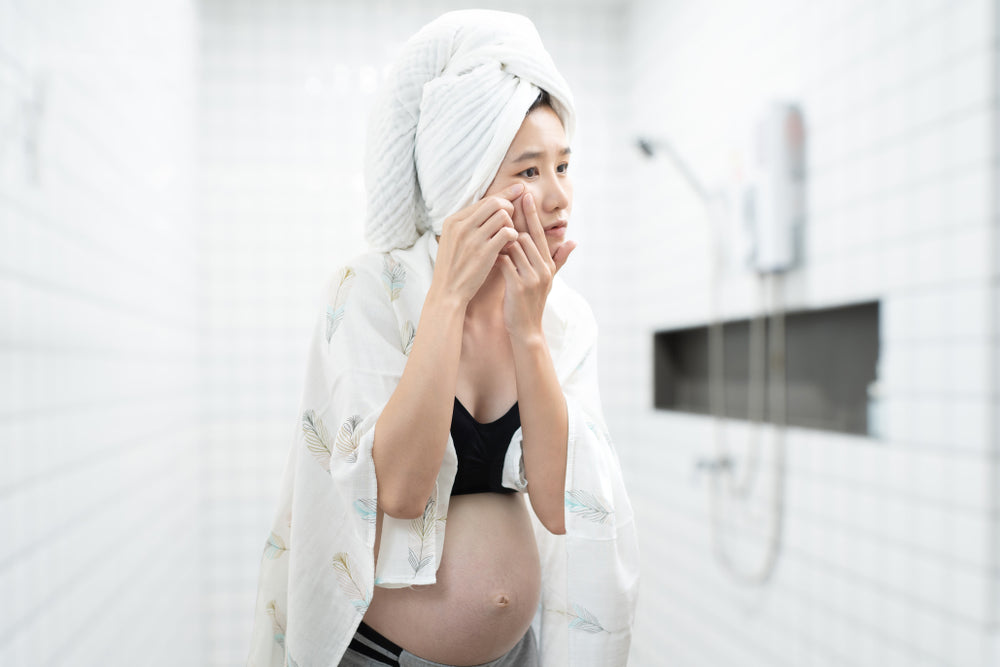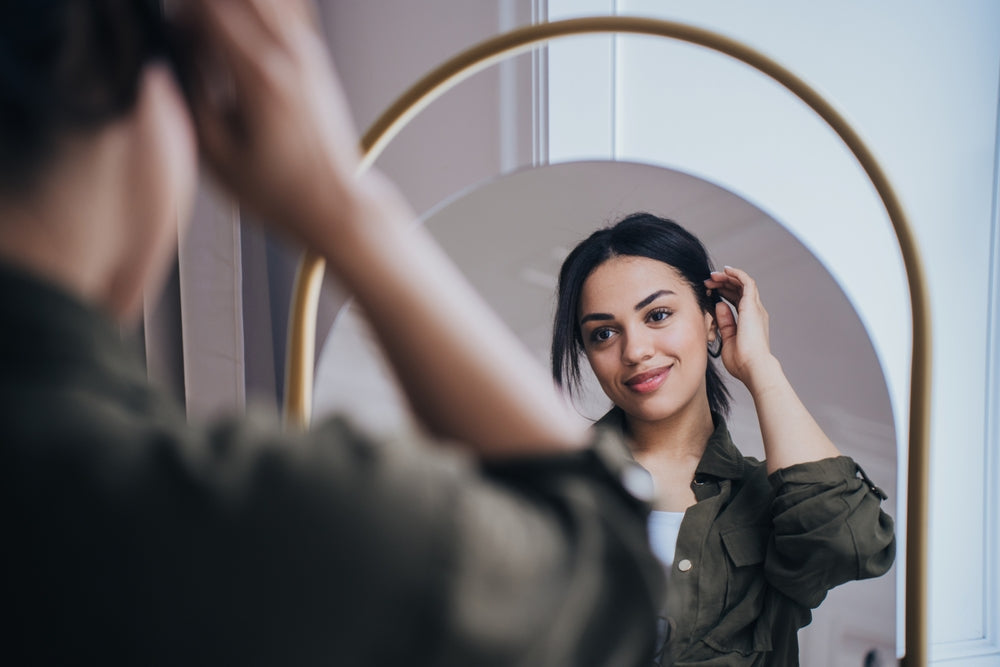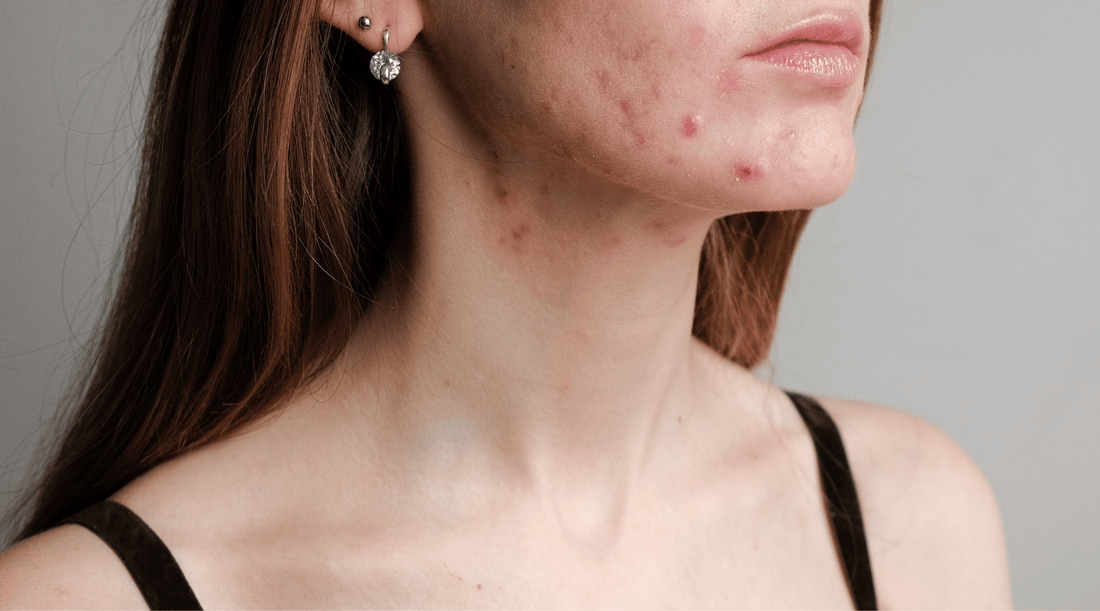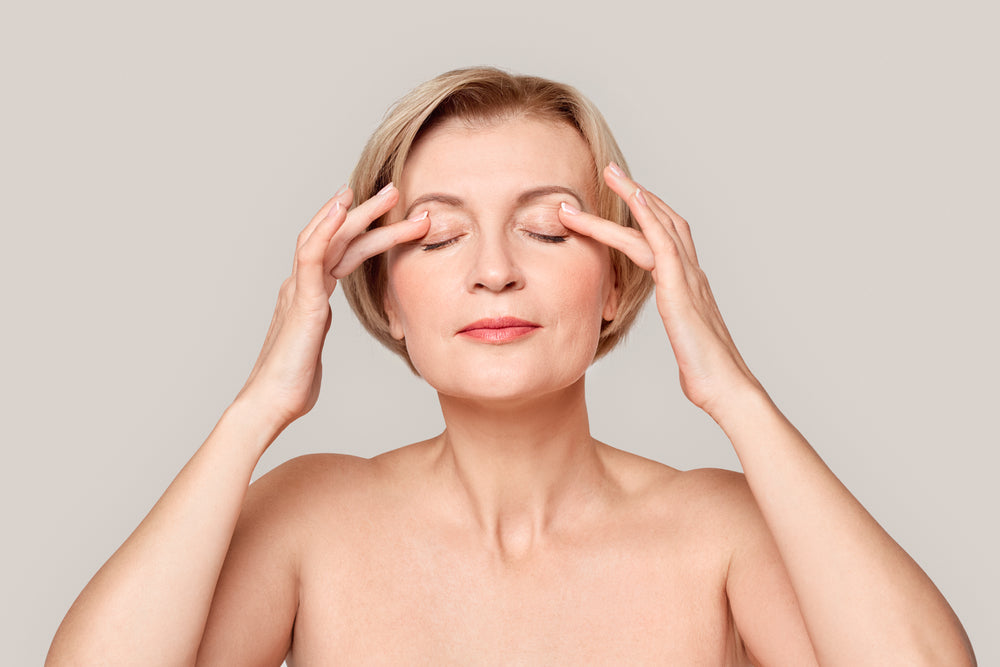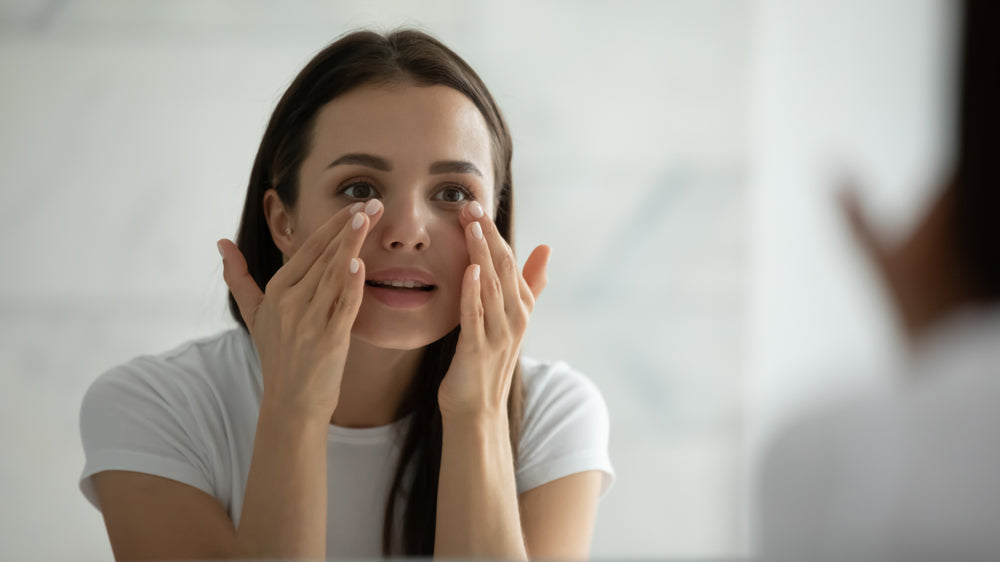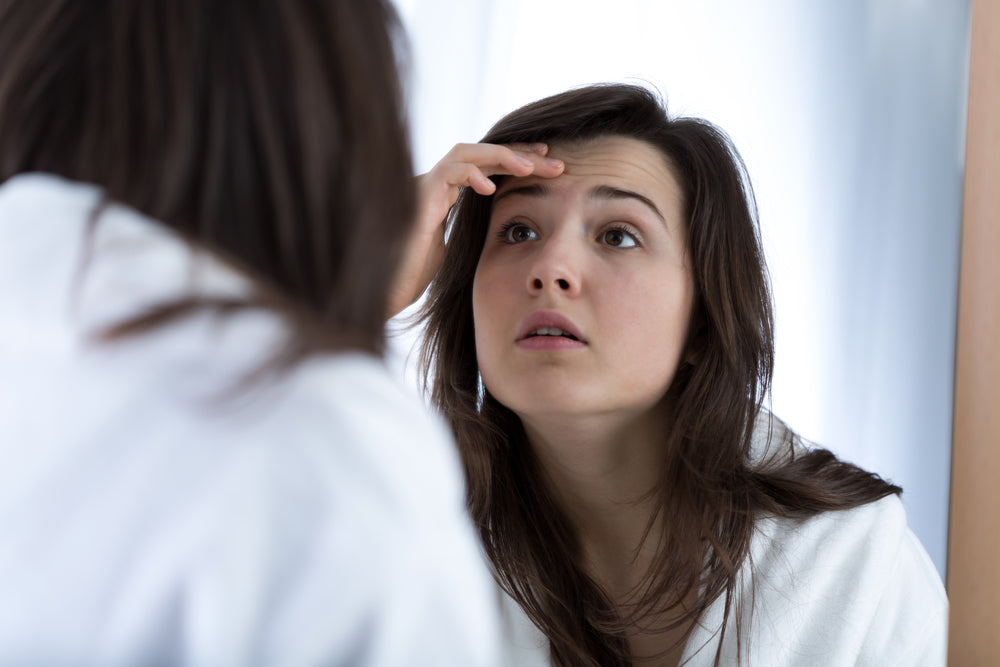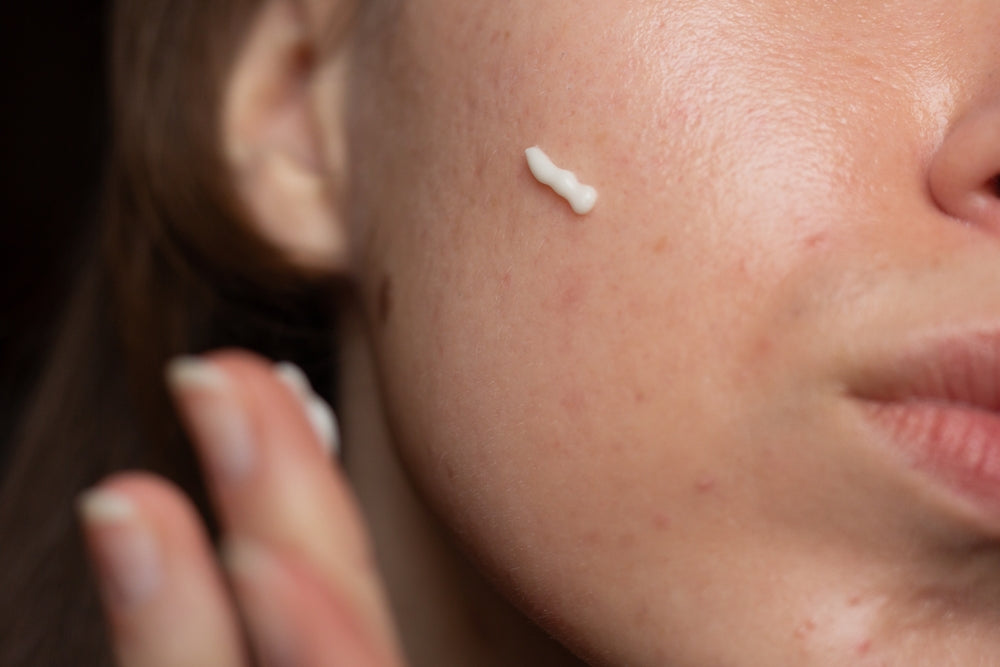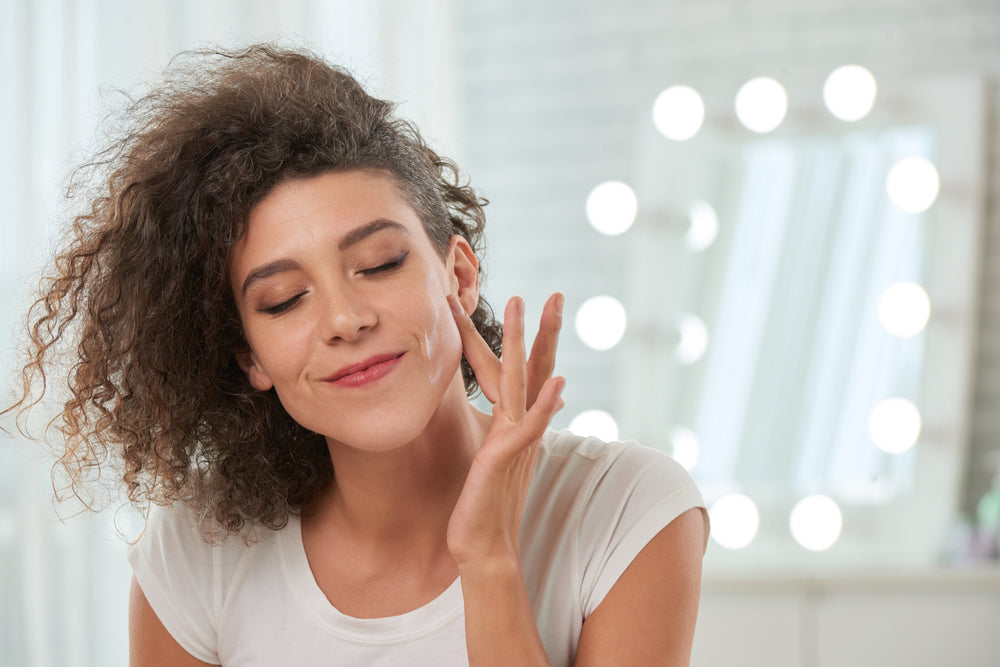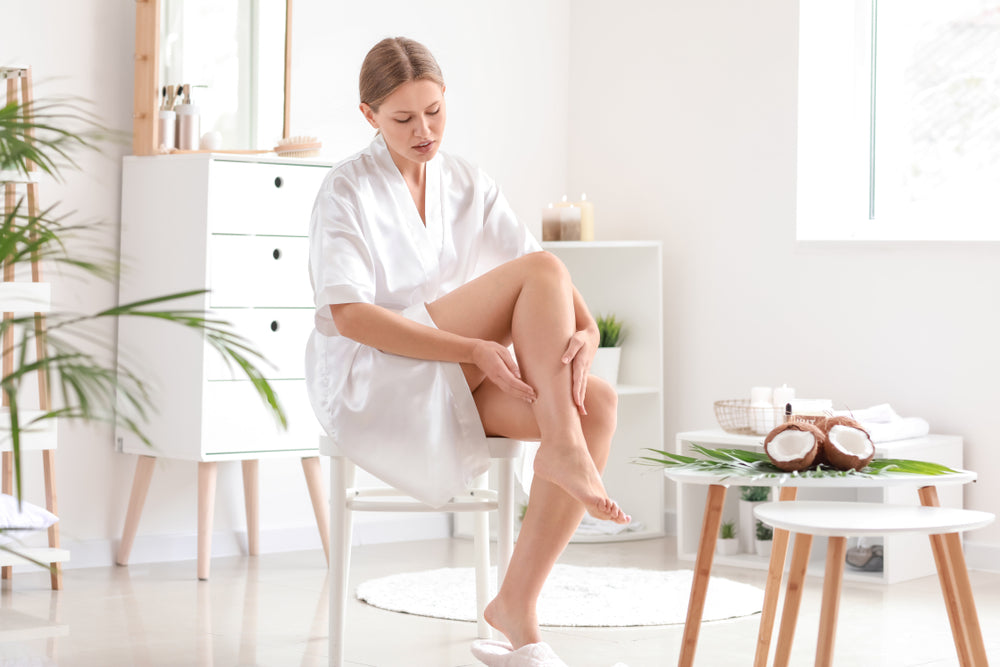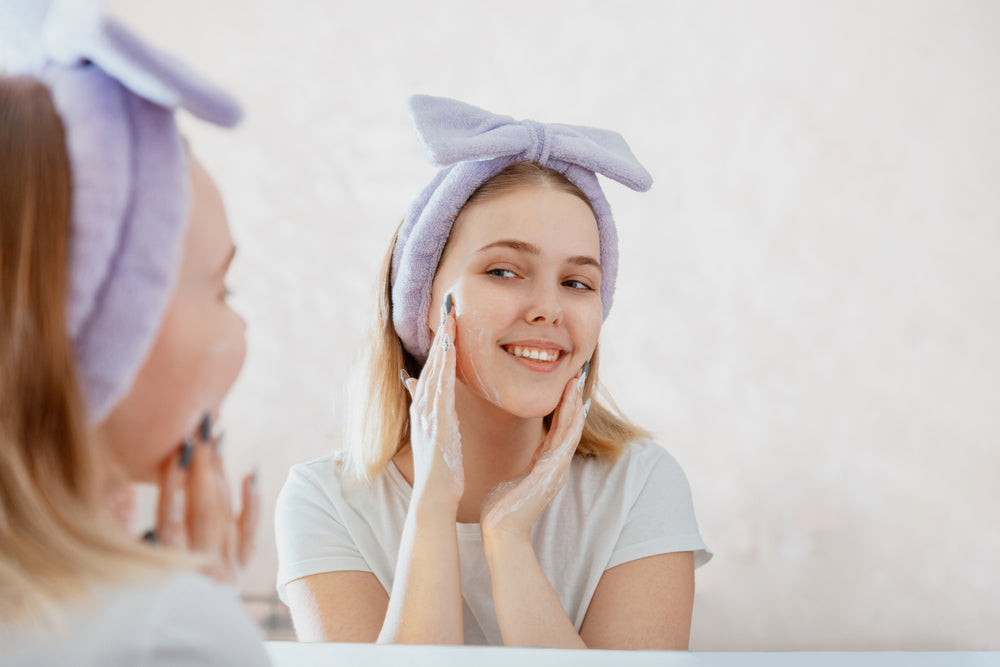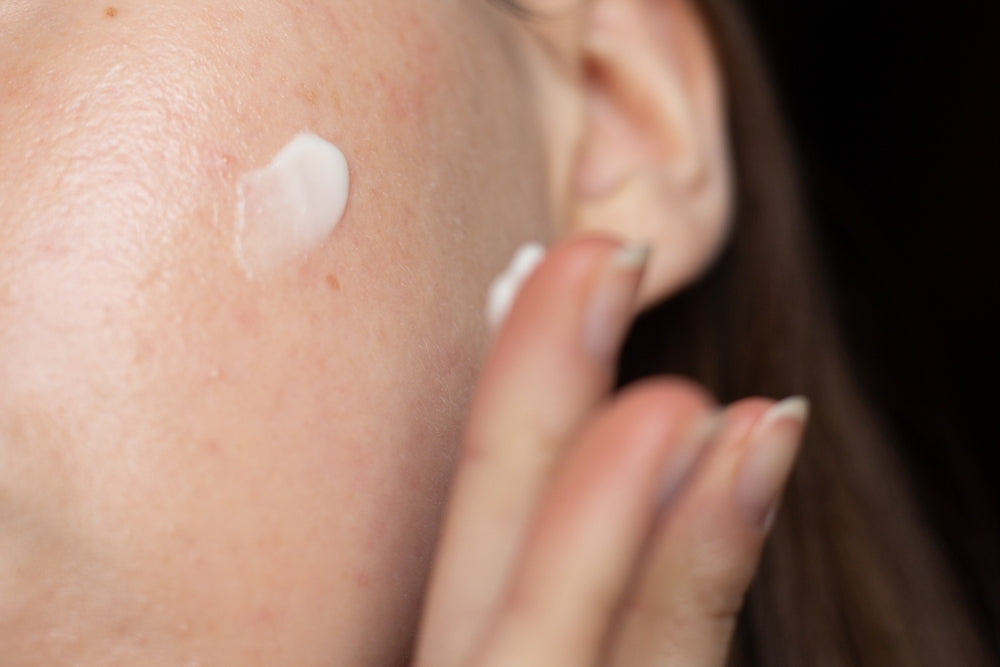Epicuren Blog
When Does Pregnancy Acne Start & How to Minimize It
While most people associate acne with puberty, acne can also occur during pregnancy. Pregnancy acne is usually mild but may be a surprising symptom that most women do not anticipate. Read on to learn more about pregnancy acne and how to minimize it. When Does Pregnancy Acne Start? Women can experience acne at any time during pregnancy, though most will begin to notice blemishes at around 6 weeks into their pregnancy. In most cases, pregnancy acne will improve during the first trimester, though more serious breakouts may return during the third trimester when androgen hormones peak. Why Does Acne Appear During Pregnancy? There are two main factors that are the cause of pregnancy acne including changes in your hormones and changes in your immune system during pregnancy. During pregnancy, your body will experience extreme hormone changes. The hormone progesterone is responsible for creating an ideal environment for the unborn baby. Androgen levels also rise during pregnancy and prepare your body for delivery. These hormonal changes can also cause your skin glands to produce more oil or sebum. This can lead to clogged pores and excess bacteria, resulting in acne. How to Address Acne Concerns During Pregnancy. Women who are unhappy with acne during pregnancy can achieve clearer looking skin with the right skincare products. There are some products that are safe to use during pregnancy, while others are not. Products to Avoid While Pregnant There are some skincare products that are not safe to use during pregnancy, and it is important to educate yourself on these products to keep you and your baby safe. If you are not sure if a product is safe to use, be sure to consult your OB/GYN or dermatologist. Some skincare products that are not safe to use while pregnant include: Spironolactone Isotretinoin Adapalene (Differin) Tazarotene Certain oral antibiotics Products You Can Use While Pregnant Thankfully, there are also many skincare products that can safely be used during pregnancy. Again, we always recommend you double check with your doctor. Some of these include: Glycolic acid Salicylic acid Azelaic acid Pregnancy Skin Care Routine for Acne While you cannot completely prevent pregnancy acne, there are some steps that you can take to reduce the appearance of acne, including the following daily skincare routine. Morning Routine Cleanse: Wash your face with a gentle cleanser. Toner: Toner completes the cleansing process by removing remaining dirt or oil. Moisturize: Avoid heavy moisturizers, as these may worsen acne. Sunscreen: Daily sunscreen application is important to protect your skin from the sun’s UV rays as well as help prevent sun damage to the skin. Night Routine Cleanse: Wash your face with a gentle cleanser. Exfoliate: Use a gentle exfoliator 1-2 times a week. Toner: Toner completes the cleansing process by removing remaining dirt or oil. Serum: Applying Microbiome Restorative All in One Serum helps skin appear balanced Moisturize: Avoid heavy moisturizers, as these may worsen acne. Extra Tips Some other tips that can be helpful for combating pregnancy acne include changing your pillowcases frequency, avoiding touching your face as much as possible, taking steps to keep your hair off of your skin as much as possible, and avoiding popping or picking existing blemishes. Read our Complete Guide to Pregnancy Skincare Routines If you are seeking further information regarding skincare and pregnancy, check out our Complete Guide to a Pregnancy Skincare Routine. Here you can also find recommended Epicuren products that will help you achieve the appearance of youthful, glowing skin. Also, check out our guide to pregnancy skincare products. Frequently Asked Questions What can I do to acne concerns during pregnancy? To reduce the appearance of acne during pregnancy, be sure to follow a gentle skincare routine daily. This will help to keep acne-causing oil and bacteria at bay. When does pregnancy acne stop? Pregnancy acne usually becomes lighter during the first trimester but may worsen as androgen levels peak during the third trimester. What causes acne in early pregnancy? Excessive production of sebum due to hormone fluctuations is the main cause of acne in early pregnancy. Where do most people get pregnancy acne? Most women see pregnancy acne on their faces, neck, chest, and back. Does pregnancy acne go away? Most pregnancy acne will go away soon after the baby is delivered.
Learn moreWhat is Tinted Moisturizer?
Are you tired of wearing a heavy foundation that feels cakey on your skin? If so, a better option may be tinted moisturizer. Read on to learn more about the benefits and disadvantages of tinted moisturizers to determine if this product is something you would like to add to your makeup routine. How Does Tinted Moisturizer Work? Tinted moisturizer is a great way to provide a light layer of coverage while also visibly hydrating the skin. It is fundamentally exactly what it sounds like: a facial moisturizer that is also tinted with makeup pigments. This allows buyers to enjoy the benefits of both moisturizer and makeup in just one product. This can ultimately shave time off of your morning routine and help you achieve a natural glow! What are the Benefits of Using Tinted Moisturizer? Tinted moisturizer offers an array of benefits for those looking for a more lightweight form of coverage. Not only does it hydrate the skin, but it also evens out skin tone, and creates a naturally radiant look. It can also improve the appearance of skin texture over time. Tinted moisturizers are also flexible products, as they can be used as a standalone product or as a base for further makeup application. Advantages of Tinted Moisturizer There are many reasons why someone would prefer a tinted moisturizer over a regular foundation. The consistency of tinted moisturizer is thinner than other creams such as BB cream or foundation, so it feels very lightweight on the skin. Unlike a BB cream, you can also choose from a wider range of shades with tinted moisturizer, so you can find the perfect match. Disadvantages of Tinted Moisturizer While there are many advantages to tinted moisturizers, there are also some disadvantages. These products usually don't address skin concerns such as fine lines, wrinkles or brightening and often contain very little SPF. Also, those who desire a fuller coverage look might not enjoy a tinted moisturizer, as there is less pigment in the product. Those with oily skin may also find that tinted moisturizers are not well suited for their skin type. Frequently Asked Questions What is the difference between tinted moisturizer and foundation? The main difference between tinted moisturizer and foundation is that tinted moisturizer offers less coverage. How do I choose the right tinted moisturizer for my skin tone? A great way to choose the best tinted moisturizer for you is to look at the color of your veins. If the veins that are visible through your skin look green, you have a warm undertone and should lean toward yellow-based tints. If your veins look blue, you likely have a pink undertone. Can I use tinted moisturizer in place of my regular moisturizer? No, tinted moisturizer is meant to offer sheer-to-light coverage and should not be used as a substitute for a moisturizing skincare product. Is tinted moisturizer suitable for all skin types? A tinted moisturizer could be a great option for many skin types depending on the ingredients of the tinted moisturizer and your overall skin concern. Pro tip- Add a drop of your favorite liquid foundation to our Colostrum Luminous Glow Cream and create your custom DIY tinted moisturizer. When you do this you get the advantages of using a high-quality moisturizer with lightweight coverage of your favorite foundation.
Learn moreFungal Acne vs. Closed Comedones
Fungal acne and closed comedones are two common skin problems that are technically classified as acne, but only one is truly acneic. Here is everything you need to know about fungal acne and closed comedones so that you can determine which type of blemish you have for a proper regime. WHAT IS FUNGAL ACNE? Fungal acne is technically a type of folliculitis or inflammation of the hair follicles, not acne. However, it looks similar to acne and can often result in the same symptoms. CAUSES OF FUNGAL ACNE Fungal acne is caused by yeast in the follicle, resulting in an infection. If the follicle is blocked or becomes infected, your skin starts to produce more yeast. This production of yeast is what triggers fungal acne. SYMPTOMS OF FUNGAL ACNE One of the first signs that you may have fungal acne is that your skin does not improve with typical acne medication. Other symptoms include irritated and inflamed hair follicles, clusters that look like whiteheads (pus-filled bumps), redness, itchiness, and a stinging sensation. Fungal acne is often detected as small red bumps on the skin. COMMON AREAS AFFECTED BY FUNGAL ACNE Fungal acne can develop anywhere on the body where hair grows, but it most often develops on the cheeks, forehead, chest, and upper back. WHAT ARE CLOSED COMEDONES? Closed comedones (comedonal acne) are more commonly known as whiteheads. Although small white bumps are the most common formation of closed, comedones they can develop as small red bumps, similar to fungal acne. Closed comedones involve the skin pores being completely blocked. Open comedones, also known as blackheads, involve partially clogged pores on the surface of the skin. CAUSES OF CLOSED COMEDONES Closed comedones are caused by excess production of sebum oil in the skin mixed with dead skin cells and surface debris. This excess oil and surface debris collects in the pores of your skin and blocks the hair follicle, creating a small bump. SYMPTOMS OF CLOSED COMEDONES An important distinction between closed comedones and fungal acne is that comedones will not be inflamed or painful. They simply develop into small white, red, or flesh-colored bumps on the skin. COMMON AREAS AFFECTED BY CLOSED COMEDONES Closed comedones most often form on the chin and forehead, but they can develop on other areas of the face and the neck, chest, and back. HOW TO COMBAT ACNE CONCERNS A fungal infection causes fungal acne and is often not treatable with acne-specific treatments. To prevent developing fungal acne itself, you should wear loose-fitting clothing and shower regularly after sweating since hot and wet skin creates a breeding ground for this folliculitis. Fungal acne can be treated with antifungal medications applied topically or taken orally. For comedonal and other forms of acne, the following ingredients and topical products can help dry out oily skin and exfoliate dead skin cells from the skin's surface: Salicylic Acid Glycolic Acid Azelaic Acid Benzoyl Peroxide Retinoids HOW TO MINIMIZE THE LOOK OF ACNE Epicuren Discovery has many skincare products designed for sensitive, acne-prone skin. If you want to reduce the appearance of acne and unclog pores, we recommend the following steps to maintain clear, healthy-looking skin. CLEANSE REGULARLY A gentle cleanser should be used twice daily—once in the morning and once at night—to remove dead skin cells and dirt that causes acne. Immediately after a sweaty workout, you should also purify the skin with a quick shower. Cleansing the skin regularly not only helps reduce the visible signs of acne but also helps maintain a glowing, healthy-looking skin tone. USE THE RIGHT MOISTURIZER Moisturizer is key for individuals with acne concerns. People with dry, combination, or oily skin should all use a moisturizer so that their skin is not tricked into overproducing oil. We recommend finding a light moisturizer tailored specifically to your skin type. DRINK PLENTY OF WATER Dehydrated, dry skin will trigger more oil production, leading to comedones and other forms of acne. Staying hydrated will maintain your skin’s healthy and radiant complexion. EAT A HEALTHY, WELL-BALANCED DIET Foods like dairy, chocolate, and sugary sweets can increase your risk of an acne breakout. To help prevent and reduce acne, try to incorporate plenty of greens and antioxidants into your diet. AVOID CLOGGING YOUR PORES Certain skincare products, makeup, and sunscreen can get trapped in the pores and cause acne. Look for oil-free or non-comedogenic products, and make sure only to apply a light layer that can be easily absorbed into the skin. HIGH-QUALITY SKINCARE FROM EPICUREN DISCOVERY To find the right products for your specific skin type and skin concerns, shop our acne products online or take a Skin Quiz. Our goal is to help you achieve the healthiest, most beautiful skin, free from acne! FREQUENTLY ASKED QUESTIONS ARE CLOSED COMEDONES PAINFUL? Closed comedones are typically not painful. If you have inflammation and pain around your skin bumps, you may have fungal acne or inflammatory acne. HOW CAN I PREVENT CLOSED COMEDONES FROM FORMING? Maintain a healthy diet, wash your face with a gentle cleanser and lukewarm water, and avoid skin or hair products with oils. HOW LONG DOES FUNGAL ACNE LAST? It often takes about 2-3 weeks for fungal acne to resolve. If the inflammation persists for over a month, you should schedule an appointment with your dermatologist for a stronger prescription. HOW IS FUNGAL ACNE TREATED? Fungal acne is mainly treated with oral or topical antifungal medications that can be found over the counter or prescribed by a dermatologist.
Learn moreWhat’s the Difference Between Eye Serum and Eye Cream?
The skin around your eyes is some of the most delicate on your entire body and is extremely susceptible to age-related changes, such as sagging, thinning, and wrinkling. That is why there are specific skincare products formulated with the delicate skin of the eye in mind. To help with the appearance of the skin around the eyes, you have many options to choose from. From eye serums to eye creams, figuring out which ones will work best for you can sometimes be confusing. We’ll help you decide which is better for your skin and what the difference is between these similar eye care products. What is Eye Serum? Eye serum is similar to other facial serums except that it's specifically formulated to help the skin around and below your eyes. Serums, in general, are known for having highly concentrated ingredients with low molecular weight, helping them absorb more quickly onto the areas in which they're applied. Common ingredients in eye serums include caffeine, antioxidants, and peptides, which can help address visible concerns such as dark circles and environmental damage. What Is Eye Cream? An eye cream is a moisturizing formula with ingredients designed to visibly hydrate the eye area, typically with richer compounds than a typical face moisturizer. The anatomy of eye creams includes emollients, which lubricate and smooth the look of skin; humectants, which help retain moisture; and occlusives, which help visibly lock in moisture. Differences Between Eye Serums and Creams The key difference between serums and creams that are designed for eye care is the consistency of the product: serums are lighter weight and gel-like, while creams are more moisturizing and thicker. However, this doesn't mean that one is necessarily better than the other. Here's a better breakdown of their main differences. Purpose If you're looking for a lighter feel, an eye serum is often the better choice. On the other hand, if your main concern is dryness around the eyes, an eye cream may be more effective. Ultimately, the best option, serum, cream, or even both, depends on your specific skin concerns and what you're hoping to achieve with your eye care routine Texture Serums typically have a lightweight, water-based consistency, whereas eye creams are thicker and more moisturizing, often with occlusive properties. Texture plays an important role depending on your current skincare routine and what you're hoping to achieve with a new product. Creams can feel heavier on the skin and may be more suitable for individuals with dryness or crepiness around the eyes. The cooling, lightweight feel of a serum may be just what you need under makeup or alone. Skin Type Benefits Nearly anyone can benefit from eye serums since their lightweight formulas can complement nearly any skin type. They're especially beneficial to people with oily skin around the eyes or mature skin that needs additional moisture. On the other hand, mature skin can also become drier with age, meaning that the more moisture you can give it, the better it will look. This is where an eye cream is particularly helpful, and individuals with dry or mature skin may benefit the most. Eye creams contain many beneficial ingredients that help enhance the appearance of skin for individuals concerned about the signs of aging. Eye Care Products By Concern In addition to your natural skin type, the specific eye concern you might have also plays a role in choosing whether to use a high-quality serum or eye cream. The most common concerns we have heard our customers citing are dark under-eye circles, puffy eyes, and crow's feet wrinkles around the corners of the eyes. Dark Circles and Puffiness Dark circles and puffiness under the eyes are often attributed to a lack of sleep, fatigue, or illness, but can also develop naturally over time due to aging or thinning of the skin around the eyes. To help this, a serum like our Eye Alive Serum is designed to reduce the appearance of these concerns in the under-eye area. Fine Lines or Crow's Feet One of the first signs of aging is crow's feet at the corners of the eyes. This can be accompanied by a general thinning of the skin that exacerbates the crepiness of the skin in this area. Our Pro Collagen + Serum Amplifier is a serum that is a cushiony and moisturizing gel-cream, perfect for the eye area. This formula is formulated with ingredients that can help your eyes appear visibly smoother, more moisturized, and target fine lines around the eyes with the help of peptides. In addition, our top-rated Eye Cream is formulated with ingredients to provide rich moisture, helping your skin look and feel smooth. High-Quality Skincare Products from Epicuren If you're looking for the best way to keep your eyes looking smooth and supple, Epicuren has the eye-specific serums and creams to help. Browse our whole section of products online or take our Skin Quiz to be matched with products that are perfect for your specific skin type and different skin concerns. Frequently Asked Questions Are eye creams or serums better? Creams and serums are different from each other, providing their own benefits for specific concerns. Serums tend to be lighter weight, while creams are more moisturizing and feel slightly heavier. Select the formula that best suits your specific skincare concerns and needs. Should I use both eye serum and eye cream? As long as the directions of your products say they can be used in the same regimen, you're free to use both an eye serum and cream. Which comes first, serum or eye cream? Due to the water-based formulas of serums, you should apply them first, then follow with a moisturizer. Eye creams can be applied after your regular moisturizer since they are thicker and more emollient. If you are layering the eye serum and eye cream, apply the serum first, then the eye cream. A general rule when applying products is to apply them from thinnest to thickest. Are eye serums worth it? Many high-quality eye serums are well worth it for the way they help people enjoy the look of their skin. Moreover, eye serums are designed specifically for the delicate skin around the eyes, so you can confidently apply them. -- Sources https://www.mayoclinic.org/diseases-conditions/bags-under-eyes/symptoms-causes/syc-20369927 https://www.mayoclinic.org/diseases-conditions/bags-under-eyes/diagnosis-treatment/drc-20369931 https://health.clevelandclinic.org/how-to-get-rid-of-eye-bags
Learn moreDoes Moisturizer Cause Acne?
No, moisturizer does not cause acne. However, choosing the right moisturizer for your skin type is important. Acneic skin needs hydration just as much as dry skin, and in some cases, a lack of proper hydration can exacerbate oily skin and contribute to breakouts. When used properly, moisturizers can help your skin without causing acne. To keep your skin looking hydrated and fresh, here are a few ways to make the most of your moisturizer and recommended products for acne-prone skin. WHY MOISTURIZERS CAN BE GOOD FOR ACNE Moisturizer is a necessary component in any skincare routine. Not using a moisturizer because you are concerned about acne may trigger more sebum production. Sebum oil is the skin's natural moisturizer. There are four main causes of acne: overproduction of oil, dead skin cell buildup in the hair follicle, bacteria, and inflammation. A moisturizer with emollient and humectant properties helps lock in moisture for less oily-looking skin. This step is one of several important parts of addressing acne concerns. Ultimately, moisturizers have many more pros than cons for fighting acne. SIGNS YOU MAY BE OVER-MOISTURIZING YOUR SKIN If you notice any of these changes in your skin, it might be a sign that you need to switch out the moisturizer you use: CLOGGED PORES Overly occlusive ingredients can trap excess oil on the skin. This excess oil mixes with dead skin cells and surface debris, causing clogged pores. Clogged pores may start off as whiteheads and blackheads but can quickly turn into inflamed acne due to bacteria being trapped beneath the surface of the skin, clogging pores. FREQUENT BREAKOUTS If you have addressed or ruled out common causes for recurrent breakouts like dirty pillowcases or phones, hormonal fluctuations, and food triggers, you should ensure you are using the right moisturizer. Some ingredients in your moisturizer may cause frequent breakouts. Luckily, there are many moisturizers to choose from for acneic skin. RASHES AND REDNESS Whenever you start a new product, it is important to do a patch test to check for sensitivity or allergic reactions. Examples of adverse reactions include rashes and visible redness. Do not use moisturizer if you have a known allergy to it or a specific ingredient. If you develop symptoms like itchiness, redness, bumps, or hives, discontinue use and consult your medical provider. EXCESS OIL PRODUCTION Using the wrong moisturizer can cause additional skin concerns if you already have oily skin. If you notice that your oily skin is worsening, try using one with a lighter texture or mix it with a hydrating serum like Moisture Surge. You can also use a hydrating gel serum. Our favorite is Strengthen and Rebuild Serum Concentrate because it contains water-loving polysaccharides and skin conditioning hydrators like jojoba oil, which are great for oily-prone and acneic skin. YOUR SKIN FEELS TIGHT It is also possible to not be moisturizing enough. Skincare products used to help acne can sometimes create a tightened feeling of the skin. Tight skin will also come with itchiness and discomfort. Adding a lightweight moisturizer with water-loving ingredients like hyaluronic acid and glycerin can help minimize the look of tight skin and keep you moving forward with your acne skincare routine. INGREDIENTS YOU SHOULD AVOID IN MOISTURIZERS Avoid using ingredients that you know trigger your breakouts. A little trial and error may be necessary to find the right one for you. Water-based moisturizers are ideal for most skin types. Heavy creams with occlusive agents are more likely to contribute to breakouts and should be avoided by acne sufferers. Instead, try a lightweight or oil-free moisturizer. HOW MUCH MOISTURIZER SHOULD BE USED? We recommend using moisturizer in the morning when you wake up and at night before you go to bed. Only use 1-3 pumps, depending on how your skin feels. Pay attention to its possible triggers if you are currently having an acne breakout. Keeping a journal of when your acne breakouts occur, the foods you are eating, changes to detergents, or anything else new may help you identify why you are breaking out. Then, adjust your moisturizer accordingly. BEST MOISTURIZER FOR ACNE Acidophilus Probiotic Moisturizer is a gentle moisturizer that works incredibly well for oily, combination, or sensitive skin types. Brazilian Propolis Lotion can be used on any skin type and includes a powerful blend of natural ingredients like vitamins, amino acids, and micronutrients to reduce the appearance of inflamed skin. You can also take our Skin Quiz to help find the right moisturizer for you. ACNE PRODUCTS FROM EPICUREN DISCOVERY At Epicuren Discovery, we believe that visibly healthy skin starts with a great skincare routine. We offer many products specially tailored to different skin concerns and skin types, including acne-prone skin. Shop our online store today for more skincare recommendations that won't worsen your acne. CAN MOISTURIZERS CAUSE MORE ACNE? Choosing the right moisturizer for your skin type and only applying a little will not cause more acne. WILL I GET PIMPLES IF I DON'T USE MOISTURIZER? Yes, it is possible to break out if you do not use a moisturizer. If you don’t use moisturizer, your skin may become dry which prompts your body to produce more sebum oil in the skin. This excess oil production can clog pores and cause more acne. IS MOISTURIZER BAD FOR ACNE? When used in moderation, moisturizer can be beneficial for acne. In fact, using a moisturizer is recommended for acne-prone skin.
Learn moreVitamin C Moisturizer: Benefits and Why You Need It
Vitamin C: It’s not just for when you’re getting a cold. This essential antioxidant is found in the food you eat as well as vitamin supplements you’ll see in the health and wellness section. And when used both topically and taken orally, Vitamin C serum benefits for your skin are endless! What is Vitamin C? Vitamin C, also known as Ascorbic Acid (AA), is a compound that is known to support your immune system, is vital to support your body's natural collagen production, and has important antioxidant functions. It is a water-soluble vitamin that can be extracted from various plants and fruits; however, it is most commonly associated with citrus fruits like oranges, where it is most abundant. As a powerful antioxidant, Vitamin C is not only beneficial to our bodies internally, it also supports a brighter, firmer, and more youthful-looking complexion topically. Vitamin C serum is known to provide benefits to all skin types, including sensitive and oily skin, by improving skin texture and promoting natural collagen production. Types of Vitamin C Vitamin C is a powerhouse ingredient in the skincare world, offering benefits for all skin types. From brightening to antioxidant support, Vitamin C can help maintain a youthful and radiant-looking complexion. But did you know that not all Vitamin C is created equal? There are different types of Vitamin C, each with its unique benefits and uses. Here are four types you should know about. Tetrahexyldecyl Ascorbate (THDC) Tetrahexyldecyl Ascorbate (THDC) is an oil-soluble Vitamin C ester that is highly stable, making it an ideal choice for skincare products. It is known for its ability to help the skin from UV-induced oxidative stress, while improving the appearance of dark spots on the skin. THDC is an ideal option for those looking for a reliable antioxidant serum suitable for sensitive skin types. Ascorbyl Glucoside Ascorbyl Glucoside is another stable form of Vitamin C that brings all the antioxidant benefits of traditional Vitamin C. It works similarly to Ascorbic Acid (AA) but with added stability. If you are looking for a Vitamin C derivative that helps against environmental stressors while maintaining a gentle profile, Ascorbyl Glucoside is an ideal option. Sodium Ascorbyl Phosphate Sodium Ascorbyl Phosphate is a Vitamin C derivative known for its ability to enhance the antioxidant power of skincare products. It is especially beneficial for those dealing with acne, as it may help reduce visible inflammation and acne lesions. With its stability and effectiveness, it is a solid addition to products targeting acne-prone skin. Magnesium Ascorbyl Phosphate Magnesium Ascorbyl Phosphate is an ideal choice for those seeking skin-brightening benefits. It helps to visibly even out skin tone and reduce discoloration, leaving you with a glowing complexion. If you are looking to brighten your skin, this option may benefit you. What Does Vitamin C Do For Skin? As an antioxidant, Vitamin C is known to defend against harmful free radicals that are found throughout your environment. These molecules interact with skin cells and damage them, leading to various adverse effects, including wrinkles, pigmentation, and even acne breakouts. Vitamin C can help support your skin in many ways and has a lot of research behind it, making it a holy grail ingredient within the skincare industry. How to Use Vitamin C Serum Vitamin C serum can be incorporated into your skin care routine with other ingredients like ferulic acid, vitamin E, and hyaluronic acid to promote the appearance of nourished skin. When you’re incorporating ingredients like Vitamin C into your skincare routine, it’s essential to know when to apply the product to get the most out of it. Because Vitamin C is an antioxidant, it’s best utilized in your morning skincare routine before you encounter the UV rays from sun exposure and other environmental stressors of the day. Most often formulated in a serum, topical Vitamin C products should be applied after cleansing and toner application. Follow up with a good moisturizer and a high-quality broad-spectrum sunscreen, and you’re set for all-day protection. Vitamin C serums can be used every day and, over time, have been shown to visibly reduce the effects of aging, such as pigmentation and fine lines. You may notice a few short- and long-term differences when you start to use Vitamin C serum, including the appearance of a more even skin tone and firmer-looking skin. How Do You Know if Your Vitamin C Serum is Working? One drawback to L-ascorbic acid is that it can oxidize easily. At Epicuren Discovery, we make sure to pack our products that include Vitamin C in airtight, opaque containers to help the product stay effective for longer, with less exposure to oxygen that causes it to fail. Our CXC Vitamin C serum is in an airless pump bottle and has a shea butter base. This enhances the levels of antioxidants and stabilizes the Vitamin C. Our Vitamin C Products The most potent of Epicuren Discovery’s Vitamin C products is our original CXC Vitamin C Complex, which is ideal for all skin types. This product is formulated with three forms of highly-stable Vitamin C derivatives that provide all the benefits of L-ascorbic acid while feeling less irritating and being suitable for sensitive skin types. You can also search for products by ingredient, which will also show you how we use ascorbic acid derivatives in products like the Defy Age Corrective Facial Oil. Take Our Skin Quiz Our catalog features science-backed formulas with effective natural ingredients like Vitamin C and other antioxidants that can take your skincare routine to the next level. Find products that are designed for your unique skin type and goals by taking our Skin Quiz today. -- Sources https://pmc.ncbi.nlm.nih.gov/articles/PMC5605218/ https://www.mayoclinic.org/drugs-supplements-vitamin-c/art-20363932 https://health.clevelandclinic.org/vitamin-c-serum
Learn moreForehead Acne Skincare Routine for Men & Women
Forehead acne is a common concern for men and women of all ages. If you suffer from frequent acne breakouts on your forehead, this is everything you need to know about how to help control the appearance of those irritating acne spots. What Causes Forehead Acne? The T-zone is the area of the face around the eyebrows and the top of the nose. This is a common place where people develop acne because it is where the skin has the highest concentration of oil glands. Forehead acne, like most forms of acne, is caused by excess production of sebum oil and pores that are clogged with oil and bacteria-carrying debris such as dirt or makeup. Clogged pores can become infected or inflamed, leading to painful acne breakouts. There are many possible causes of forehead acne but these are some of the most common acne triggers: Hair Products Hair products containing alcohol or acids could irritate the skin and worsen acne on the forehead. Hair products may also contain oils like argan oil, coconut oil, palm oil, and more that clog the pores. Avoid products like gel, wax, and pomades or be careful about how much you apply. Puberty Hormonal changes during puberty will alter the amount of oil your skin produces. If you suddenly start to produce more oil during puberty and your teenage years, it is easier for clogged pores and the resulting acne to develop. Makeup Makeup can clog the pores, especially when thick layers of foundation or other products are applied. Additionally, makeup that is left on the skin can invade the pores of your skin and cause an acne breakout. Your skin might also be sensitive to certain chemicals in your makeup products so consider a non-comedogenic product. Medication Several prescription medications list acne breakouts and skin sensitivity as possible side effects. Some of these medications include steroids, barbiturates, and lithium. If you think your medication could be a possible trigger for your forehead acne or you are starting a new medication, talk to your doctor about this potential side effect. How to Get Rid of Forehead Acne Change Your Pillowcase You might not want to think about this, but your pillowcase can harbor bacteria and dirt that may be worsening your acne. Change your pillowcase and sheets regularly to give your skin a clean place to relax and rest. You should also wash your face before going to bed each night to prevent the transfer of surface debris that may have built up on your skin throughout the day. Keep Hands Away from Face Your hands come in contact with a lot of bacteria-harboring items throughout the day (doorknobs, phones, etc.). Transferring that bacteria to your face could worsen inflammation and exacerbate an acne breakout. Avoid Headbands & Hats Many people wear headbands or hats while working out which means those accessories harbor the sweat you shed. Headbands and hats may also put pressure or friction on the forehead which could irritate the skin and existing acne. No Pimple Popping The pimple popping trend might look satisfying but popping or picking at pimples could worsen your breakout. Popping a pimple spreads the bacteria to the surrounding area which could cause more acne to form. Additionally, picking at acne spots could lead to permanent scarring. Wash Your Forehead After Prolonged Activity After exercising, it is always important to give your skin a fresh start by thoroughly cleansing it to remove sweat, dirt, and environmental impurities. Sweat does not directly cause acne, but it can worsen clogged pores in combination with oil production and surface impurities. Morning Skincare Routine Wash hands Apply cleanser Pat face dry Toner Spot treatment Apply lightweight moisturizer Apply sunscreen Evening Skincare Routine Wash hands Apply cleanser Double cleanse if wearing makeup Mask and exfoliate (once a week) Toner Apply serum Apply moisturizer Our Recommended Products Clarify Starter Kit: clarify treatment kit that includes the probiotic facial cream, clarify cleanser, and clarify exfoliating astringent Clarify Blemish Eraser: another great option for spot treatment that includes salicylic acid, tea tree oil, and aloe vera Brazilian Propolis Duo: a mist and lotion rich in vitamins and minerals that moisturize the skin Citrus Herbal Cleanser: a sulfate-free cleanser that dissolves excess oil Chai Soy Mud Mask: targets clogged pores and excess oil while visibly brightening the skin with antioxidants and minerals Volcanic Clay Mask: the perfect mask for all skin types to soften and brighten the appearance of the skin Find Your Perfect Acne Treatment at Epicuren Discovery Epicuren Discovery is dedicated to healthy, happy skin with quality-made products proven to be effective for helping with acne and many other skin concerns. Take a Skin Quiz to find the best products for your skin type and browse our collection of products targeted for acne treatment. Frequently Asked Questions Can you get rid of forehead acne overnight? Unfortunately, it can take several days or weeks before you see clear skin but with the right products, you might see small improvements overnight. Will using a moisturizer make forehead acne worse? There is a common misconception, although understandable, that using moisturizer could worsen acne. In contrast, not using moisturizer will make your skin produce more oil to try and keep it hydrated. This excess oil production is what will contribute to acne breakouts, not moisturizers. Will a cleanser help with forehead acne? Yes! Cleansing the skin removes surface impurities like makeup and dirt that can clog the pores. Products with salicylic acid are a great choice because they can break up clogged pores and prevent acne breakouts.
Learn moreRetinol vs Retinoids for Acne: Which is Better?
If you are interested in skincare, you may have heard the term “retinoid” and “retinol” thrown around. However, what is the difference between these two compounds, and what exactly do they do? Read on to learn more! What Is a Retinoid? Retinoids are a class of compounds derived from vitamin A. Nowadays, these products are found pretty much anywhere you can purchase beauty products, including makeup stores, pharmacies, and grocery stores. The majority of retinoids are applied topically, while others such as Accutane are oral medications. Retinoids work by promoting collagen and elastin production, visibly improving skin texture, and helping reduce the appearance of wrinkles over time. These combined benefits make them a popular choice for acne treatment and skin rejuvenation. What is Retinol? Retinol is a type of retinoid that is used in many over-the-counter products.. It is the most widely used, most stable, and well-tolerated retinoid for cosmetic use. Concentration usually ranges between 0.0015% to 0.3%. While it is an effective ingredient, it is different from prescription-strength retinoids molecularly. Retinols require a two stage conversion within the skin to go from retinol to retinoic acid. Retinoic acid is only available by prescription and is called tretinoin. Retinoid Benefits Retinoids are an essential ingredient for successfully addressing acne concerns, and when paired with sun protection, are fantastic for combatting the visible signs of aging. Retinoids are often known as the gold standard in skincare. Retinol Benefits Whether you are using retinol or a prescription retinoid, they are both essential ingredients to successfully help with acne; and when paired with sun protection, are fantastic for combatting the visible signs of aging. Sun exposure is one of the main causes of premature aging and hyperpigmentation. Retinoids are often known as the gold standard in skincare because they can effectively combat acne and other skin concerns. Retinol and tretinoin are often recommended by skincare professionals and dermatologists due to their reliability in the treatment of the appearance of acne, fine lines and wrinkles, and sun-damaged skin. Even sensitive skin can benefit from a retinol product when added slowly to a skincare routine. Additionally, retinol is known to improve barrier function and increase natural moisturizing factors over time. It is also an effective antioxidant, which helps reduce oxidative stress - a contributing factor to the aging process. Incorporating retinol even once a week can benefit the skin. How do I use retinol creams or retinoids? If your dermatologist or provider has prescribed tretinoin or retinol, there are some steps you should follow to ensure you are getting the most out of your treatment. You should apply the retinoid product in a pea size amount to the entire face once daily in the evening to clean dry skin. It is also recommended to leave your retinoid on for a minimum of five to thirty minutes before applying other products. You should also be sure to apply a moisturizer afterward to keep your skin moisturized. Also, never apply retinoid or retinol cream at the same time as benzoyl peroxide, which may cause irritation. What are the side effects of retinol and retinoids? Both retinol and retinoids can cause similar side effects including itchiness, redness, and skin sensitivity to sunlight, which is why it is important to wear sunscreen both indoors and outdoors. If these effects become bothersome to you, reach out to your provider to discuss possible solutions. The Best Products At Epicuren Discovery, our Retinol Anti-Wrinkle Complex is a synergistic blend of vitamin A and glycolic acid formulated to combat the visible signs of aging. It can also be paired with our CXC Vitamin C Complex to create a great Prevention & Correction Duo. Frequently Asked Questions Should I start with retinoid or retinol? If you have sensitive skin that is prone to irritation, over-the-counter retinol may be a good starting point, as it is not as potent as prescription retinoids. Retinol vs Tretinoin - Which retinoid is best for acne? Prescription-strength topical retinoids such as tretinoin, are most commonly used for the treatment of acne and acne scars. However, compliance is often difficult due to the side effects when beginning usage. Talk to your provider to see what options are right for you. You may be surprised that retinol may be just as good and more tolerable for clearing acne, especially when first using topical retinoids.. Sources Zaenglein, A. L., et al. (2016). Guidelines of care for the management of acne vulgaris. Journal of the Academy of Dermatology. Spierings, N. M. K. (2021). Evidence for the efficacy of over-the-counter vitamin A cosmetic products in improvement of facial skin aging: A systematic review. Journal of Clinical and Aesthetic Dermatology.
Learn moreHow to Use Face Serums for Best Results
If you’re looking for ways to elevate your skincare regimen, then face serums are a great addition. It can be overwhelming to consider your options and wonder how to incorporate new products into your daily routine. Coming up with the right skincare regimen can take a little research, but with some best practices, you can start transforming your skin with high-quality skincare products. Here’s what you should know about face serums and how to use them for the best results. What is a Face Serum? Face serums are products that help address specific skin concerns. They’re typically lightweight products that are designed to quickly absorb onto the skin where they can deliver a concentrated dose of active ingredients. When to Use Face Serum During Your Skincare Routine As a general rule, it’s best to apply serums and other products in order of “thinnest to thickest.” This means serums are best applied before your moisturizer and sunscreen. Here’s a quick example routine to follow: Cleanse: Use a gentle cleanser with warm water. Rinse and gently pat dry with a clean towel. Tone: Gently swipe or mist toner all over your face and neck Serum: Apply a few drops of serum to your skin and gently massage it in. Wait: It’s best to give your skin a few minutes to absorb the benefits of your serum. Moisturize: Apply moisturizer all over your face and neck, making sure it’s completely absorbed. If you have dry skin, consider applying another layer. During your night routine, you may want a thicker cream moisturizer to lock in moisture. Sunscreen: During your morning routine, make sure to apply sunscreen to your face, neck, and ears. Allow your sunscreen to absorb for a few minutes before applying makeup and before sun exposure. Why Should You Use Face Serum? You can select a face serum for virtually any skin concern, so there are a lot of benefits to including one in your daily regimen. Here are some of the most common reasons to include a serum in your regimen. Fine Lines & Wrinkles The signs of aging, like fine lines and wrinkles, are a result of losing collagen as you age. Collagen normally supports your skin, keeping it looking youthful and lifted. Serums that contain ingredients such as retinol, peptides, or vitamin C can be great options for supporting natural collagen production. Sensitive, Oily, or Acne-Prone Skin Some serums can help manage various types of skin concerns, including acne-prone, oily, and sensitive skin. They might contain ingredients to help reduce visible inflammation or sensitivity, or to exfoliate and address the appearance of breakouts. Oxidative Stress Your skin comes into contact with damaging factors every day, called oxidative stress. These factors might include sunlight, pollution, and smoke. These things can allow free radicals to damage the skin and accelerate the visible signs of aging. Serums can contain ingredients like vitamin C and other antioxidants, which have been known to neutralize free radicals. Dullness and Discoloration As a result of aging and many other factors, the skin can become dull and discolored over time. Serums containing brightening ingredients like vitamin C, bearberry, and niacinamide can help boost your complexion’s appearance for a more noticeable glow. Is It Possible to Use Too Much Serum? When it comes to skincare products, keep in mind that there’s only so much product that your skin can absorb at one time. It’s best to only use serums once or twice per day, depending on your skin type and chosen product. More sensitive skin types can become irritated by too many active ingredients. Finally, if you begin incorporating too many serums at once, you may not be able to tell which ones are causing irritation and which ones aren’t – it’s best to focus on one or two serums to address specific concerns. Types of Face Serums and How to Use Them There are a variety of different serums, and it’s always best to follow the directions on the box. Here’s what to know about our best face serums and how to use them. How to Use Vitamin C Serum Vitamin C serums like our CXC Vitamin C Complex are best used once per day in the morning to help against oxidative stress throughout the day. After cleansing and toning, apply a dime-sized amount all over your face and neck to help reduce the appearance of fine lines and wrinkles and improve your skin’s overall appearance. How to Use Hyaluronic Acid Serum Hyaluronic acid can give your skin a moisturizing boost. Serums like our Moisture Surge Hyaluronic Acid Gel can help support sensitive skin with ingredients that promote hydration throughout the day. Apply a dime-sized amount on the face and neck after toning in the morning and night. How to Use Retinol Serum Retinols like our Retinol Anti Wrinkle Complex are made with vitamin A and glycolic acid, which are known to give your skin a boost. This formulation can help enhance the appearance and texture of your skin. Apply a pea-sized amount on the clean, dry skin. It’s best used at night, three to five times per week. If you have never used retinol before, start by incorporating it slowly (every other day) and build up to more days as your skin acclimates to it. You can also apply it on top of moisturizer to buffer it if you have more sensitive skin. Retinol is most effective when used daily, so don’t give up too soon! How to Use Eye Serum Eye serums like our Eye Alive Serum contain ingredients to help visibly brighten and refresh the delicate skin around the eyes. It can also help reduce the appearance of dark under-eye circles, giving you a more awake look. After toning, apply a tiny amount around the eyes on the orbital bone. Use in the morning and at night for a moisturized and softer-looking eye area. How to Use Brightening Cream Brightening duos like our Prevention & Correction Duo can combine the best of both worlds with ingredients known to visibly brighten and rejuvenate the skin. Apply a dime-sized amount of the CXC Vitamin C Complex in the morning after toning to help against oxidative stress. Then, apply a pea-sized amount of the Retinol Anti-Wrinkle Complex all over your face in the evening. Skincare Products from Epicuren Discovery At Epicuren Discovery, we offer a curated selection of face serums tailored to meet your skincare needs. Our products are formulated with high-quality ingredients, scientifically-backed technologies, and are results-driven. Browse our online product catalog or take our skincare quiz to learn more. Frequently Asked Questions What is the best way to apply face serum? Face serum should be applied after cleansing and toning your face. If you use multiple serums or treatments, make sure to apply them from thinnest to thickest. Finish with a moisturizer and sunscreen. Avoid applying too many active ingredients or serums at once. Instead, opt for one serum in the morning and one at night. How long should I leave serum on my face? Once you apply your serum, you do not remove it. It’s best to apply serum before you apply moisturizer. Is it good to apply serum on the face daily? This can depend on the type of serum – some serums, such as those containing vitamin C or hyaluronic acid, can be used once or twice daily. Make sure to follow the instructions on the box to get the most benefits out of the serum. Do you rub serum into your face? When applying serum, depending on consistency, gently massage or press a dime-sized amount into your skin. This should include your face and neck. -- Sources https://health.clevelandclinic.org/vitamin-c-serum https://www.mayoclinic.org/healthy-lifestyle/adult-health/in-depth/skin-care/art-20048237 https://pmc.ncbi.nlm.nih.gov/articles/PMC3140905/
Learn moreCoconut Oil Moisturizer Cream: Benefits & Uses
Coconut oil has a wide range of uses from cooking to your skincare routine. When it is used as a moisturizer, make sure to use specific types of coconut oil so that you can achieve all the benefits of this natural elixir for your skin! What is Coconut Oil? Coconut oil is made from the white flesh of coconuts and the way it is processed creates different types of oil. Virgin coconut oil is made from fresh coconut and the fruit is either expeller-pressed using heat or cold-pressed which does not use heat and allows the oil to maintain more nutrients. Refined coconut oil is made with dried coconut which is heated to remove the odor and filtered to get rid of bacteria or debris. This filtration process sometimes uses chemicals, but you can find organic coconut oil that is grown without any synthetic pesticides. Why Does It Work So Well? Coconut oil is made of fatty acid chains that create a protective barrier on the skin’s surface. This barrier helps the skin lock in moisture and keep toxins out. Coconut oil is also packed with antioxidants that promote healthy skin, improve sensitive skin, and fight against environmental factors that cause signs of aging. Benefits of Coconut Oil on Skin Coconut oil is all-natural, smells great, and has many benefits for your skin! Hydration Visibly Smooths and softens Minimizes the look of fine lines and wrinkles Helps visibly reduce redness and skin irritation Nutrient-rich antioxidants Absorbs easily for instant hydration Great exfoliant base Best Type of Coconut Oil for Skin To maintain healthy, youthful skin, you want the best products in your skincare routine. Look for coconut oil that is organic, virgin, and cold-pressed since it is the least processed and therefore has the most nutrients. Avoid processed coconut oil that is intended for cooking. How to Use Coconut Oil for Your Skin Coconut oil can be used as a cleanser, moisturizer, or makeup remover. It is also equally beneficial for your scalp and hair! Coconut Oil as a Moisturizer If you use coconut oil as a moisturizer, follow the same steps you normally do in your skincare routine. We recommend cleanser, toner, serum, eye cream, coconut oil moisturizer, and sunscreen in that order to get the maximum benefits for your skin. If you don’t want to use pure coconut oil, there are many facial cleansers and moisturizers that use it as a main ingredient: Kukui Coconut After Bath is an all-over body moisturizer that leaves the skin glowing Try Kukui Nut Coconut Massage & Body Oil at home or in one of our Epicuren spas Coconut Hydrating Milk can be used as a moisturizer on both hair and body Nourish Daily Antioxidant Moisturizer a light-weight moisturizer for the skin on your face, neck, and décolletage. Eye Alive Serum contains coconut oil and kukui oil to help with the appearance of dark circles What Skin Type is it Good For? Coconut oil is great for all skin types: sensitive, dry, mature, oily, and combination. The properties of coconut oil can help improve skin sensitivity, visible signs of aging, and hydrate dry skin, making it the perfect product for just about anyone! Frequently Asked Question? Is coconut oil moisturizing cream good for your face? Coconut oil moisturizing cream is just as beneficial for your face as it is for the skin on the rest of your body. People with dry or flaky skin find coconut oil moisturizing cream to be especially beneficial. Is coconut oil cream good for your skin? Yes! Coconut oil creams help reduce visible inflammation, eliminate harmful bacteria, and help individuals concerned with wounds or acne care. Is it good to put coconut oil on your face every day? Most people can benefit from using coconut oil every day but if you have congested skin, consider using a lighter oil. What are the benefits of moisturizing cream? Moisturizing creams keep the skin hydrated to maintain the appearance of a bright, smooth complexion. Moisturizing Creams from Epicuren Discovery At Epicuren Discovery, our goal is for everyone to achieve the best possible skin and it’s why we rely on natural ingredients like coconut oil in our skincare products. Shop our skincare products by category and take the Skin Quiz today to find the best products customized to your skin type and skin concerns.
Learn moreTeen Skincare Routine for Glowing Skin
The teenage years can present some unique challenges for your teen’s skin. With so many changes going on, skincare is never more important for teens. It can be difficult to know what exactly your teen needs out of their acne-prone skincare regimen, but with this teen skincare routine using our best products, you can help your teen achieve glowing skin and better confidence. Morning Skincare Routine for Teenagers In the morning, your teen can begin by cleansing with a gentle, foaming cleanser. If your teen has acne-prone skin, consider a cleanser that contains salicylic acid a common acne-clearing ingredient. Pat dry and apply any treatments like niacinamide, which can help control visible oil production. Next, tone skin with a nourishing toner. Then, apply an unscented moisturizer all over the face and neck. The most important part of a morning skincare routine is applying sunscreen that has at least SPF 30. This can help prevent the appearance of hyperpigmentation and acne scarring, as well as photodamage if your teen uses any acne treatments. Just make sure your teen’s sunscreen is non-comedogenic and won’t cause breakouts. Nighttime Skincare Routine for Teenagers If your teen wears makeup, it’s extremely important to begin by removing it thoroughly with a makeup remover or micellar water. Make sure to avoid makeup removing wipes since they can be harsh on the skin. Then, wash with a gentle, foaming cleanser and apply any acne treatments according to instructions. Serums containing hyaluronic acid can be an effective way to further lock in moisture for acne-prone skin. Finally, finish with a thicker nighttime moisturizer to help hydrate the skin while sleeping. What are the best skincare products for teens? If you’re not sure where to start with your teen’s skincare routine, we can help. Our Clarify Kit contains a basic regimen for oily and acne-prone skin, containing our Clarify Cleanser, Exfoliating Astringent, and Acidophilus Probiotic Facial Cream. Our Clarify Blemish Eraser is an acne spot treatment containing salicylic acid and aloe vera to help with the appearance of unclogged pores and outbreaks. Finally, our X-Treme Cream Propolis Sunscreen offers SPF 45+ protection without clogging pores and can be used daily to help protect against sun damage. Skincare Products from Epicuren Discovery At Epicuren Discovery, we offer a luxurious and transformative approach to skincare. With our gentle formulations backed by the latest scientific developments, your teen can enjoy clear and radiant looking skin for a lifetime. Browse our online catalog or take our skin quiz to get started on our curated selection. Frequently Asked Questions When do teens need to start a skincare routine? This can be different for each teen, but we often recommend kids start practicing basic skincare habits as early as 10 years old. This can help them establish good hygiene that can better equip them to deal with the changes to their skin later on. If your teen doesn’t already have a skincare routine, however, it’s not too late to begin one. How many times a day should a teenager practice their skincare routine? For most teens, a daytime and nighttime regimen is enough to help them maintain good levels of hydration. Although many teens tend to have oily skin, washing it too often can strip it of natural moisture and worsen oil production.
Learn moreHow Long Does It Take for Acne Scars to Visibly Fade & How to Help Scars from Forming
Many people struggle with acne and are embarrassed by their blemished skin, especially when scars are left after a severe acne breakout. Luckily, there are many options for cosmetic procedures that treat acne scars and skincare products used to help scars from happening in the future. What Causes Acne Scars? Acne scars form when the skin does not heal properly after an acne breakout. Sometimes there is an overproduction of collagen during the healing process that results in a buildup of scar tissue. Other times, the follicular wall in your pores is unable to heal correctly because it has been broken down by the buildup of dead skin cells, sebum oil, and bacteria that causes acne formation. Types of Acne Scars There are two types of acne scars: depressed scars and raised scars. Discoloration is another long-term side effect that often results from severe acne. Depressed Scars Depressed or pitted acne scars develop as an indent in the skin, usually on the cheeks and forehead. The pits or indentations can be shallow or extend into the deeper layers of the skin. Depressed scars often develop from inflammatory acne. They can be best treated with fractional laser treatment, IPL or a Photofacial, and microneedling. There are three types of depressed scars: Rolling Scars: wide indentations with sloping edges Boxcar Scars: wide indentations with sharply defined, steep edges Icepick Scars: deep, narrow pits that look similar to an enlarged pore Raised Scars Raised scars often develop because too much scar tissue developed during the healing process after cystic acne. These scars commonly develop on the chest, back, or jawline as bulges of thick, rubbery scar tissue, also called a keloid or hypertrophic scar. Laser skin resurfacing is one of the most popular and effective treatments for raised scars. Discoloration Although discoloration is not a scar, it is an equally bothersome side effect of acne. Sometimes this discoloration can fade but for some individuals, the abnormal dark spots are permanent. There are two main types of discoloration that can come from acne: Hypopigmentation: light spots resulting from a decrease in melanin production after a skin injury (such as an acne breakout) Erythema: permanent redness resulting from damaged skin cells and dilated capillaries near the skin’s surface How to Help Visibly Reduce Scars from Happening in the Future? Soothe Dermal Repair Balm Soothe Dermal Repair Balm hydrates and nourishes dry sensitive skin. Keeping your skin looking moisturized can help the appearance of scars from forming or limit the severity of the scar since scars form after a wound dries out and forms a scab. Soothe Dermal Repair Mist Soothe Dermal Repair Mist is a light toner that contains a powerful combination of plant-based extracts and ingredients that can visibly help irritated skin. This mist is perfect for sensitive skin and will help improve the appearance of red or inflamed skin during an acne breakout. The Best At-Home Products to Help Reduce Acne Scars Vitamin E has been known to help reduce the appearance of visible scars. Topical vitamin E can be purchased over the counter in most stores. Metadermabolic Enzyme Protein Complex is highly recommended for acne scars but should only be used once the acne is gone and no longer active. Epicuren® Skincare for Acne and Acne Scars Epicuren® Discovery offers a wide variety of products to help visibly combat the appearance of acne and scarring. You deserve to feel confident in your skin and our skincare company is dedicated to helping you find the best products for your specific skin type and concerns. Take our Skin Quiz and shop online today for these scar-treating products and more.
Learn more

